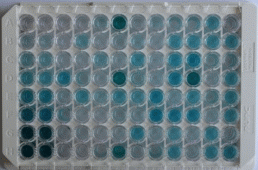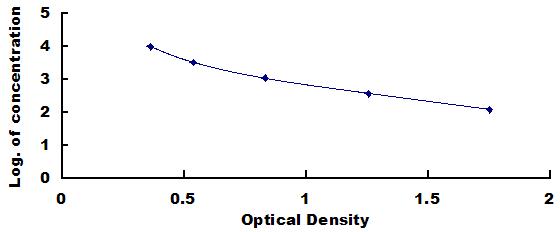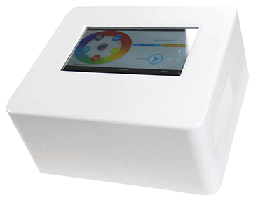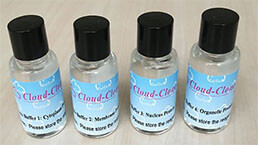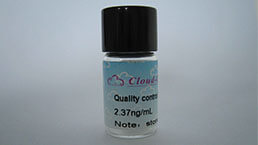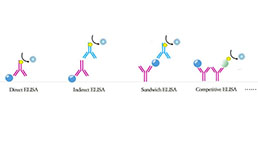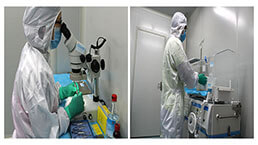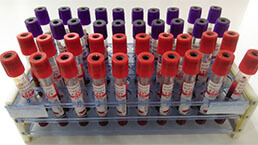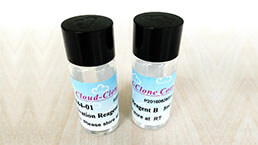Packages (Simulation)

Reagent Preparation

Image (I)
Image (II)
Certificate


ELISA Kit for Synaptophysin (SYP)
Major synaptic vesicle protein p38
- Product No.CEA425Hu
- Organism SpeciesHomo sapiens (Human) Same name, Different species.
- Sample Typeserum, plasma, tissue homogenates, cell lysates, cell culture supernates and other biological fluids
- Test MethodCompetitive Inhibition
- Assay Length2h
- Detection Range123.5-10,000pg/mL
- SensitivityThe minimum detectable dose of this kit is typically less than 53.3pg/mL.
- DownloadInstruction Manual
- UOM 48T96T 96T*5 96T*10 96T*100
- FOB
US$ 441
US$ 630
US$ 2835
US$ 5355
US$ 44100
For more details, please contact local distributors!
Specificity
This assay has high sensitivity and excellent specificity for detection of Synaptophysin (SYP).
No significant cross-reactivity or interference between Synaptophysin (SYP) and analogues was observed.
Recovery
Matrices listed below were spiked with certain level of recombinant Synaptophysin (SYP) and the recovery rates were calculated by comparing the measured value to the expected amount of Synaptophysin (SYP) in samples.
| Matrix | Recovery range (%) | Average(%) |
| serum(n=5) | 98-105 | 102 |
| EDTA plasma(n=5) | 78-93 | 90 |
| heparin plasma(n=5) | 78-102 | 85 |
Precision
Intra-assay Precision (Precision within an assay): 3 samples with low, middle and high level Synaptophysin (SYP) were tested 20 times on one plate, respectively.
Inter-assay Precision (Precision between assays): 3 samples with low, middle and high level Synaptophysin (SYP) were tested on 3 different plates, 8 replicates in each plate.
CV(%) = SD/meanX100
Intra-Assay: CV<10%
Inter-Assay: CV<12%
Linearity
The linearity of the kit was assayed by testing samples spiked with appropriate concentration of Synaptophysin (SYP) and their serial dilutions. The results were demonstrated by the percentage of calculated concentration to the expected.
| Sample | 1:2 | 1:4 | 1:8 | 1:16 |
| serum(n=5) | 79-95% | 87-98% | 85-92% | 99-105% |
| EDTA plasma(n=5) | 94-101% | 91-101% | 85-95% | 86-101% |
| heparin plasma(n=5) | 89-101% | 79-97% | 90-101% | 80-102% |
Stability
The stability of kit is determined by the loss rate of activity. The loss rate of this kit is less than 5% within the expiration date under appropriate storage condition.
To minimize extra influence on the performance, operation procedures and lab conditions, especially room temperature, air humidity, incubator temperature should be strictly controlled. It is also strongly suggested that the whole assay is performed by the same operator from the beginning to the end.
Reagents and materials provided
| Reagents | Quantity | Reagents | Quantity |
| Pre-coated, ready to use 96-well strip plate | 1 | Plate sealer for 96 wells | 4 |
| Standard | 2 | Standard Diluent | 1×20mL |
| Detection Reagent A | 1×120µL | Assay Diluent A | 1×12mL |
| Detection Reagent B | 1×120µL | Assay Diluent B | 1×12mL |
| TMB Substrate | 1×9mL | Stop Solution | 1×6mL |
| Wash Buffer (30 × concentrate) | 1×20mL | Instruction manual | 1 |
Assay procedure summary
1. Prepare all reagents, samples and standards;
2. Add 50µL standard or sample to each well.
And then add 50µL prepared Detection Reagent A immediately.
Shake and mix. Incubate 1 hour at 37°C;
3. Aspirate and wash 3 times;
4. Add 100µL prepared Detection Reagent B. Incubate 30 minutes at 37°C;
5. Aspirate and wash 5 times;
6. Add 90µL Substrate Solution. Incubate 10-20 minutes at 37°C;
7. Add 50µL Stop Solution. Read at 450 nm immediately.
GIVEAWAYS
INCREMENT SERVICES
| Magazine | Citations |
| Neuropsychopharmacology | Increased Amyloid-β Peptide-Induced Memory Deficits in Phospholipid Transfer Protein (PLTP) Gene Knockout Mice Nature: Source |
| United States Application US20140378440 | BACLOFEN AND ACAMPROSATE BASED THERAPY OF NEUROLOGICAL DISORDERS Read more: http://www.faqs.org/patents/app/20130090307#ixzz3VGRXUqW9 Faqs:Source |
| Scientific Reports | In Vivo Characterization of ARN14140, a Memantine/Galantamine-Based Multi-Target Compound for Alzheimer's Disease pubmed:27609215 |
| IOS Press Content Library | An Intranasal Formulation of Erythropoietin (Neuro-EPO) Prevents Memory Deficits and Amyloid Toxicity in the APPSwe Transgenic Mouse Model of Alzheimer's … articles:journal-of-alzheimers-disease |
| University of British Columbia | Investigating the roles of SRRM4 in contribution to neuroendocrine prostate cancer progression |
| pharmacological research | Neuroprotection in non-transgenic and transgenic mouse models of Alzheimer's disease by positive modulation of σ1 receptors Pubmed: 31048034 |
| Nutrients | Fermented Goat Milk Consumption Enhances Brain Molecular Functions during Iron Deficiency Anemia Recovery Pubmed: 31591353 |
| ACS Applied Materials & Interfaces | Tunable Substrate Functionalities Direct Stem Cell Fate toward Electrophysiologically Distinguishable Neuron-like and Glial-like Cells 33356098 |
| JOURNAL OF MOLECULAR NEUROSCIENCE | Enriched Environment Minimizes Anxiety/Depressive-Like Behavior in Rats Exposed to Immobilization Stress and Augments Hippocampal Neurogenesis (In Vitro) 33492617 |
| Catalog No. | Related products for research use of Homo sapiens (Human) Organism species | Applications (RESEARCH USE ONLY!) |
| RPA425Hu01 | Recombinant Synaptophysin (SYP) | Positive Control; Immunogen; SDS-PAGE; WB. |
| CPA425Hu21 | OVA Conjugated Synaptophysin (SYP) | Immunogen; SDS-PAGE; WB. |
| PAA425Hu02 | Polyclonal Antibody to Synaptophysin (SYP) | WB |
| PAA425Hu01 | Polyclonal Antibody to Synaptophysin (SYP) | WB; IHC |
| PAA425Hu08 | Polyclonal Antibody to Synaptophysin (SYP) | WB |
| LAA425Hu61 | Cy3-Linked Polyclonal Antibody to Synaptophysin (SYP) | WB; IHC; ICC; IF. |
| MAA425Hu22 | Monoclonal Antibody to Synaptophysin (SYP) | IHC |
| MAA425Hu21 | Monoclonal Antibody to Synaptophysin (SYP) | IHC |
| SEA425Hu | ELISA Kit for Synaptophysin (SYP) | Enzyme-linked immunosorbent assay for Antigen Detection. |
| CEA425Hu | ELISA Kit for Synaptophysin (SYP) | Enzyme-linked immunosorbent assay for Antigen Detection. |
| LMA425Hu | Multiplex Assay Kit for Synaptophysin (SYP) ,etc. by FLIA (Flow Luminescence Immunoassay) | FLIA Kit for Antigen Detection. |
| KSA425Hu01 | ELISA Kit DIY Materials for Synaptophysin (SYP) | Main materials for "Do It (ELISA Kit) Yourself". |

